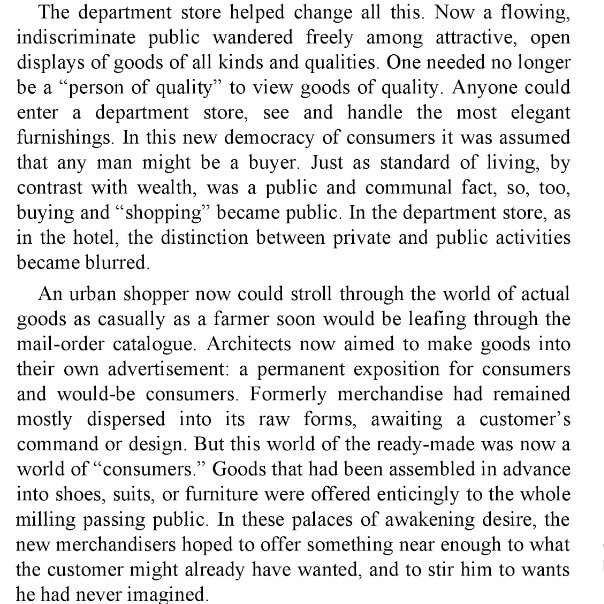Ricochet is the best place on the internet to discuss the issues of the day, either through commenting on posts or writing your own for our active and dynamic community in a fully moderated environment. In addition, the Ricochet Audio Network offers over 50 original podcasts with new episodes released every day.
 How the American Department Store Advanced Democratic Capitalism
How the American Department Store Advanced Democratic Capitalism

Marshall Field and Company.
“Palaces of consumption” is what historian Daniel Boorstin calls those large, urban retail stores that emerged in the latter half of the 19th century. Among them: R.H. Macy’s in New York, Jordan Marsh in Boston, Marshall Field & Co. in Chicago. The great department stores, which — as Boorstin writes in The Americans: The Democratic Experience — “gave dignity, importance, and publicity to the acts of shopping and buying — new communal acts in a new America.
It was a revolution, one that expanded “shop” from just a noun into a verb, as well. Previously, especially in the Old World, stores were small and specialized. The best of them were hardly open to the general public. Only “people of quality” need walk though their doors. “Common citizens might spent their lives without ever seeing a wide array of the fancy goods that they could not afford, ” Boorstin writes, and continues:

A number of innovations helped create the department store, itself an innovation. Advances in cast iron enabled the department store to be tall, bright, light, and open. These structural improvements when combined with plate glass created not just “shopping” but “window shopping.” Fast, safe, electric elevators made upper floors more accessible, while the new streetcar took city dweller to the city centers where stood these grand palaces of consumption. And among the innovations generated by the department store was the “fixed price” or “one price” policy. No haggling. Again, Boorstin:

Not only was innovative market capitalism creating never-before-seen abundance amid the Industrial Revolution and Great Enrichment, but it was also creating the mechanisms for that abundance to broadly distributed.
Of course, competitive capitalism rolls on, creating new challengers, new ways of doing business. From the Wall Street Journal: “Macy’s Inc. said it would close 100 stores, admitting that some locations were worth more as real estate than retail outlets as shoppers continue to spend more online and at discount chains.”
Published in Culture, Economics



The even more important development might have been the REA and the Sears/Montgomery Ward mail order business. Talk about a democratic retail experience when America was still largely rural.
At its pinnacle, Sears sold homes (kits) and cars. In my old neighborhood people paid a premium to buy a nice little bungalow that was known as the Sears house and then restored it. They were nuts about that house. When they were done, it looked like the sketch in the catalogue.
We have lots of those homes here in Monrovia, CA and they’re darling. One of the clues you have a mail order house is to find a part number stamped on the back of a built-in drawer
There’s never a bad time to quote Boorstin. His books should be required reading, both on American history and the creative mind (see The Discoverers). They’re a delight to read and deeply insightful.